

English Phonetic Transcription) Text to Phonetics. Jon_Stansell_The_Use_of_Music_in_Learning_Languages.pdf (application/pdf Object) Music, Language, and the Brain - San Diego Aniruddh D. Patel Senior Fellow The Neurosciences Institute - Google Books. Language Experience in Second Language Speech Learning: In Honor of James ... - James Emil Flege - Google Books. Mozarteffect.pdf (application/pdf Object) Music & STP. Frances H.
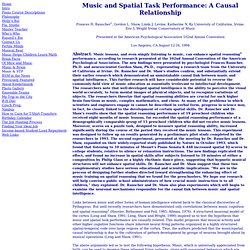
Rauscher1, Gordon L. Shaw, Linda J. Levine, Katherine N. Ky University of California, Irvine; Eric L Wright Irvine Conservatory of Music Presented at the American Psychological Association 102nd Annual Convention Los Angeles, CA August 12-16, 1994 Abstract: Music lessons, and even simply listening to music, can enhance spatial reasoning2 performance, according to research presented at the 102nd Annual Convention of the American Psychological Association. The above arguments led us to test the following hypothesis: Music, which is universally appreciated from birth, can be used to develop these inherent firing patterns, along with associated behaviors which are relevant to spatial reasoning. We present here data from two complementary studies which replicate and explore previous findings.
The first study presented here replicated these findings, and tested the effects of highly repetitive music (Philip Glass' minimalism and trance-style dance music) on spatial reasoning. Results. LynnWaterhouse.pdf (application/pdf Object) Melodies that help:The relation between language aptitude and musical intelligence. Message.
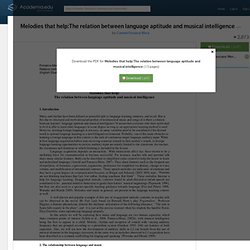
The speaker aims to achieve the greatest possible impact on the listener, with the least effortrequired in the decoding process by the latter (Fonseca-Mora, 2002b). These speech melodies have aspecific role in L1 and L2 acquisition. 3. The relationship between music and language - Lutz Jäncke - Google Books. Suggestology - Lozanov, - Google Books. Music: Physician for Times to Come - Google Books. 294 - janvier 2011. Mozart's music does not make you smarter, study finds. For over 15 years, scientists have been discussing alleged performance-enhancing effects of hearing classical music.

Now, University of Vienna researchers Jakob Pietschnig, Martin Voracek and Anton K. Intelligence - Mozart effect–Shmozart effect: A meta-analysis. Nyas.pdf (application/pdf Object) Musilanguage.pdf (application/pdf Object) Musiclanguage.pdf (application/pdf Object) Acoustical Society of America - 161st Lay Language Papers. [ Lay Language Paper Index | Press Room ] William J.
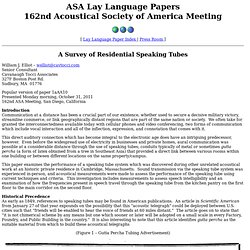
Elliot – welliot@cavtocci.com Senior Consultant Cavanaugh Tocci Associates 327F Boston Post Rd. Sudbury, MA 01776 Popular version of paper 1aAA10 Presented Monday morning, October 31, 2011 162nd ASA Meeting, San Diego, California Introduction Communication at a distance has been a crucial part of our existence, whether used to secure a decisive military victory, streamline commerce, or link geographically distant regions that are part of the same nation or society. This direct auditory connection which has become integral to the electronic age does have an intriguing predecessor, however. This paper examines the performance of a speaking tube system which was discovered during other unrelated acoustical work at an historic private residence in Cambridge, Massachusetts. Historical Precedence As early as 1849, references to speaking tubes may be found in American publications.
THe Sound System of Language. The English /h/ only occurs at the beginning of the syllable, as in hot or perhaps, never at the end, despite its occasional presence in the spelling.
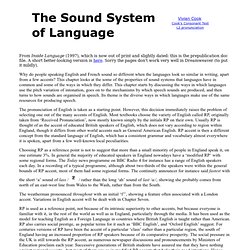
That is to say, there are no English words pronounced as toh /t‘ œ h/ and perpah /p‘ pa:h/. The absence of final /h/ seems obvious to an English speaker. After all, how can one hear a sound that is just air breathed out if nothing follows it? It is equally obvious to a speaker of Persian that the word /mah/ (moon) differs from the word /ma/ (us) and that /j‰ h/ (position) differs from /j‰ h/ (place); Persians have no problems in hearing a final /h/. Frequency_chart_lg.gif (GIF Image, 1026 × 709 pixels) - Scaled (89%) Music Perception: An Interdisciplinary Journal, Vol. 16, No. 1 (Fall, 1998), pp. 27-42. The Fabb–Halle approach to metrical stress theory as a window on commonalities between music and language : Language and Music as Cognitive Systems Oxford Scholarship Online. DOI:10.1093/acprof:oso/9780199553426.003.0003 This chapter comments on the discussion in Chapter 2.
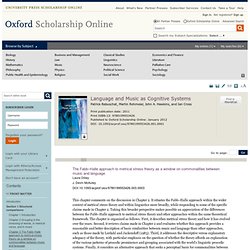
It situates the Fabb–Halle approach within the wider context of metrical stress theory and within linguistics more broadly, while responding to some of the specific claims made in Chapter 2. Taking this broader perspective makes possible an appreciation of the differences between the Fabb–Halle approach to metrical stress theory and other approaches within the same theoretical framework. The chapter is organized as follows. First, it describes metrical stress theory and how it has evolved over the years. Keywords: metrical stress theory, linguistics, music, language, prosodic prominence, grouping, linguistic prosodic systems Oxford Scholarship Online requires a subscription or purchase to access the full text of books within the service.
Using Music to Enhance Second Language Acquisition - From Theory to Practice. The cerebral haemodynamics of music perception. Music That Works: Contributions of Biology, Neurophysiology, Psychology ... - Google Books. Gottfried Schlaug: Music and the Brain (Podcasts) Title: Making Music Changes Brains Speaker: Dr.
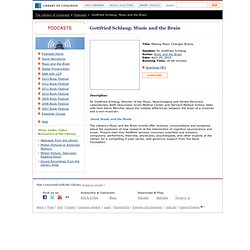
Gottfried Schlaug Series: Music and the Brain Date: April 29, 2010 Running Time: 18:46 minutes Download MP3 Description: Dr. The Library's Music and the Brain events offer lectures, conversations and symposia about the explosion of new research at the intersection of cognitive neuroscience and music. Music and the Brain (Podcasts) About Music and the Brain The Library's Music and the Brain events offer lectures, conversations and symposia about the explosion of new research at the intersection of cognitive neuroscience and music.
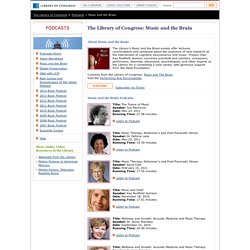
Project chair Kay Redfield Jamison convenes scientists and scholars, composers, performers, theorists, physicians, psychologists, and other experts at the Library for a compelling 2-year series, with generous support from the Dana Foundation. Concerts from the Library of Congress: Music and The Brain. Visit the Performing Arts Encyclopedia Subscribe via iTunes Music and the Brain Podcasts Title: The Future of Music Speaker: Tod Machover Date: May 23, 2011 Running Time: 27:58 minutes Listen to Podcast. Multiple Intelligence Theory and Foreign Language Learning: Multiple Intelligence Theory and Foreign Language Learning © Servicio de Publicaciones.

Universidad de Murcia. Mozart doesn't make you clever. Language Vs. Music? Exploring Music's Links to Language - Jeanette Gonsior - Google Books. Patel_Iversen_2007_TICS.pdf (application/pdf Object) Publications. Patel_2012_LMCS_response.pdf (application/pdf Object) Patel_OUP_Handbook_chapter_2009.pdf (application/pdf Object) Patel_2012_LMCS_chapter.pdf (application/pdf Object) The Ear And The Voice - Alfred A. Tomatis - Google Books. MultipleIntelligenceMozart.pdf (application/pdf Object) AJSSH2013(2.1-07).pdf (application/pdf Object) MP040120.PDF (application/pdf Object) Music and the Brain. Music and the Brain Laurence O'Donnell "Music is so naturally united with us that we cannot be free from it even if we so desired" (Boethius cited by Storr).
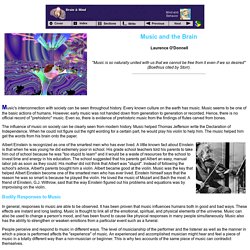
Music's interconnection with society can be seen throughout history. Every known culture on the earth has music. Music seems to be one of the basic actions of humans. The influence of music on society can be clearly seen from modern history. Albert Einstein is recognized as one of the smartest men who has ever lived. Bodily Responses to Music In general, responses to music are able to be observed. L'épreuve de linguistique à l'agrégation interne d'anglais - Denis Jamet, Catherine Mérillou, Nigel Quayle - Google Books. SSA: La grammaire de l’ incipit dans « Jug of Silver » et « A Diamond Guitar » de Truman Capote. Y a-t-il une grammaire de l’incipit ?
C’est à cette question que tente de répondre le présent article. Dans un premier temps, il convient de circonscrire l’objet de l’étude, à savoir, l’incipit élargi. Pour ce faire, les outils relevant de la grammaire, de la pragmatique et de la narratologie sont utilisés en conjonction. L’étude se concentre sur deux nouvelles de Truman Capote, (« Jug of Silver » et « A Diamond Guitar »), et propose une lecture comparée des deux régimes d’ouverture qu’elles mettent en œuvre. L’observation du discours littéraire doit, dans une perspective stylistique, donner accès à une lecture globale des textes.
. « Essentially, I think of myself as a stylist ». Böer_et_al_2012_a.pdf (application/pdf Object) Words, Meaning and Vocabulary: An Introduction to Modern English Lexicology - Howard Jackson, Etienne Zé Amvela - Google Books. Classification_of_compounds.pdf (application/pdf Object) TESI_SARA.PDF (application/pdf Object) Renner2008.pdf (application/pdf Object) What Is Syntax? - All About Linguistics. So, what is syntax? You’ve probably heard of it before, but never really known what it was. Syntax is basically the structure of sentences. Sentences have to follow certain structural rules in order to make sense.
You can’t just throw any words together to make a sentence! Order words make sense need to… this doesn’t make sense! Words need order to make sense…. So what is the structure of a sentence? Phrases Sentences are made up of smaller phrases. In a phrase, we must have a word which is called the head. Modifiers So ‘the’ and ‘far away’ have to be given a name to distinguish them from the head. Don’t worry, this will all become a lot easier with some practise. Noun Phrase A noun phrase is usually the person or thing that is performing the verb in the sentence. The person doing the verb in a sentence is known as the subject. A noun phrase has to be made up of a noun, such as a name or a tangible object. Syntax Trees To explain sentence structures, we draw trees. Verb Phrases Constituents. 03_Reduplication_shortening.pdf (application/pdf Object)
Words_vs_phrases.pdf (application/pdf Object) The Criteria of Compounds. Compounding.pdf (application/pdf Object) Word-Formation in English - Ingo Plag - Google Books. Word Formation. Handbook of Word-Formation - Google Books. Compounds. (A video is displayed at the end of this page.) Compounding is a morphological process, a word formation process. Compound words are formed with two or more base words, as in songbird and polar ice cap. They are also formed with roots--usually Latin or Greek roots, as in manuscript and telescope. Many scientific terms are compound words composed of several roots, including über-lengthy chemical names and more succinct animal classification taxonomies.
For example, the picture shows a poisonous frog. Compound nouns have traditionally begun as separate or hyphenated words but with a strong tendency over time to collapse into single words. A MORE important issue yet remains, one that is concerned with learning word meanings: In many (but not all) compound words, the final word carries most of the linguistic load. Understanding any given compound will also require context, else one could think a goldfish is a fish made of metal rather than muscle (or grain). Words, Meaning and Vocabulary: An Introduction to Modern English Lexicology - Howard Jackson, Etienne Zé Amvela - Google Books.
Word-formation2000.pdf (application/pdf Object)